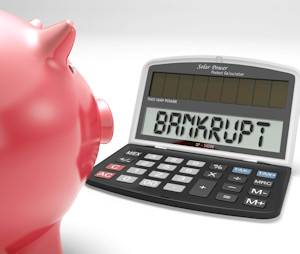When we think of bankruptcy we often think of irresponsibility with money, but there are many reasons you might need to file including, job loss, divorce, tax liens and credit card debt. According to a Harvard study, 62% of all bankruptcies are the result of medical debts. One type of debt that can’t be discharged through bankruptcy is student loans.
Regardless of the reason that you find it necessary to file, it’s important to remember that this process isn’t as bad as you think. In fact, there are benefits that you can potentially reap from filing.
No More Calls From Creditors

Cancel Your Debt

Chapter 13 bankruptcy is where you make payments on your debt. Working with an attorney to file bankruptcy could be a good way to decide which type of claim is best for you. In Chapter 13, your attorney will negotiate a payment plan that is acceptable to all parties and your debts will be discharged after the payment plan is complete. In our article Basic Bankruptcy Facts You Should Know we discuss the differences between these types of filing.
 Rebuild Your Credit
Rebuild Your Credit
Your credit score will go down after you file. However, you can start rebuilding your credit immediately after the process is done. In fact, many people have noticed that their credit score increased by 100 points within a year of filing for bankruptcy.
You can also apply for credit cards and loans after you file. However, you probably won’t be able to get the best interest rates. But, if you consistently make payments on time, then you will be able to rebuild your credit over time.
Will Everyone Know?
Many people are ashamed to file for bankruptcy because they don’t want their friends/co-workers to know. Unfortunately, bankruptcy is a matter of public record. When you file, the court will notify all of your creditors (i.e. anyone you owe money). Also, the court will notify anyone who co-signed a debt for you, since they may be liable for covering some of these debts in the bankruptcy process. But if your friends or co-workers don’t fall into either or those categories, then you don’t have to tell them. So unless they happen to discover it through a chance contact at the court they will probably never find out.
In the past, filing for bankruptcy was a major black mark on your reputation, but as we stated earlier many people have filed through no fault of their own i.e. medical debts. Filing is a life-changing decision. However, it does not have to ruin your life. In fact, filing is designed to give you a second chance. You will be able to get a fresh start financially, get rid of your debt and stop harassing phone calls. Furthermore, no one has to know that you filed. However, you do need to budget carefully to ensure that you don’t end up in the same situation all over again.
See Also:
- 5 Things to Consider Before Filing for Bankruptcy
- Are You Too Broke for Bankruptcy?
- When is Filing Bankruptcy Necessary?
- How to Hurt Your Credit Score
- Dealing with Student Loan Debt and Bankruptcy
- The Wealthy Buy Assets, the Poor Buy Liabilities, and the Middle Class Buy Liabilities Believing They Are Assets
Recommended by Amazon:
- How to File for Chapter 7 Bankruptcy
- The New Bankruptcy: Will It Work for You?
- Personal Bankruptcy Laws For Dummies
- Chapter 13 Bankruptcy: Keep Your Property & Repay Debts Over Time
- The Foreclosure Survival Guide: Keep Your House or Walk Away With Money in Your Pocket
Images courtesy of BlogPiks.com

 Rebuild Your Credit
Rebuild Your Credit